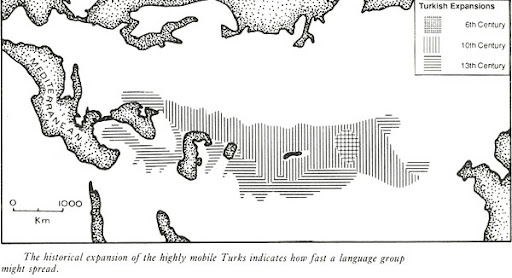The Turanian Fallacy
The Turanian Fallacy
In Iranian mythology, Fereidun has three sons: Iraj (Aria), Tur and Salm (Sayrima). Salm receives Rum (Rome, the West). Tur receives the East. Iraj receives Iran.
It is supposed that Iranians are descendants of Iraj, Turanians come from Tur and the Sarmatians are from Salm. All these peoples are of Iranian origin.
The Turanians were the original Iranian peoples of Central Asia who unlike the civilized Iranians were less developed, had a nomadic way of life and had a different religion. The Iranians and the Turanians were often engaged in war, depicted beautifully in Ferdowsi’s Shahnameh.
The conquest of Central Asia in the sixth century AD by the primitive ancestors of the Turks, the Tu Kiu, who invaded from a region north of Mongolia, changed the demography of the area in favor of the Turks.
The celebrated Turkologist Gumilev states: “ethnicities of Aryan (Iranian) origin lived in Iran and Turan who were racially closely related. What separated Iran and Turan were not racial or linguistic differences but it was solely religion that was responsible for the division”. According to Gumilev this rift came about with the advent of Zoroastrianism which did not gain popular following among those ethnicities who are referred to as Turanians.
Markwart considers the Turanians of Iranian origin who led a nomadic life and were culturally inferior to civilized and agricultural Iranians. They would frequently attack the Iranians and plunder them therefore the Iranians called them “tur” which in certain Iranian dialects has the meaning of savage, lawless or mad.
Bartold also confirms that “the name Turan appears in Avesta. It seems that the Turanians were a branch of Aryans with an inferior civilization [to that of Iran]. There was a certain enmity among the Turanians and Iranians. Since the sixth century AD when the Turks reached Central Asia, the resemblance between the names caused some to regard Turan and Turk as one and the same, while there is no relation between the two names”.
Diakonov confirms that the Turanians were of Iranian origin and he believes they were the same as the Saka (Scythians). He states that the languages spoken in Central Asia right until the first few centuries AD belonged to the Iranian family.
Abusing the similarity between the terms Turk and Turan, the Turks have also usurped the word Turanian (along with the rest of the universe) and have undeservedly attributed it to themselves.


0 Comments:
Post a Comment
<< Home